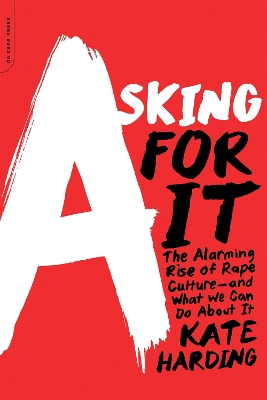Reviewed by Jo on
Asking For It: The Alarming Rise of Rape Culture and What We Can Do About It by Kate Harding, is, as you can probably tell, non-fiction. It's not YA non-fiction either. Technically, it doesn't work for Sex in Teen Lit Month II, but seeing as the last week and a half has been focused on sex crimes in YA, rape in particular, I thought this was an ideal time to review it.
This book. This. Book. I cannot even begin to tell you how incredible it is. With all the YA novels on rape and rape culture I've been reading recently, I thought I had a pretty good grasp on what constitutes rape, but I had my eyes opened by Asking For It in so many ways.
Before reading, I was slightly worried Asking For It would be quite an academic text, and one I would struggle to get my head round. But it's not, it's so accessible, I had no problem understanding anything Harding explained. Considering people tend not to understand exactly what constitutes as rape and who is at fault, Asking For It being so accessible is fantastic, because you're left without any doubt whatsoever. Harding tells us, "These are the facts, these are the figures, this is the law - this is rape," with a voice that is angry, using sarcasm to illustrate her points.
Harding talks us through the seven different rape myths that are behind rape culture, and throughout the book we are shown how these myths have formed part of society's consciousness, and have, time and again, caused us to lay blame for so many rapes and sexual assaults at the feet of the victims. We're shown actual cases and how they were dealt with by the police, by defence attorneys, in court rooms. Harding even covers how American pro-life politicians have discussed rape and just how badly they have got it wrong, as well as false accusations, how we tell women to protect themselves to protect rape and sexual assault but don't tell men not to rape, how TV shows, the media and pop culture talk about or represent rape and sexual assault, and even trolls and Gamergate.
I can't review this book with any kind of justice. Not only because I have a proof I'm unable to quote, but also because I just want to discuss every aspect of this book, and you're better off just buying it and reading it yourself. This is a book that really should be read by everyone; men and women; teenagers and adults; police, lawyers, judges; those who might some day be sitting on the jury for a rape/sexual assault (i.e. again, everyone), journalists, TV and movie writers. Everyone. If we all read this book, if we all understood exactly what constitutes as rape, if we understood how and why society shouts down the victims almost every time a rape is reported, if we understood why so few victims report rape, why so few of the rapes reported are convicted, perhaps this would all change.
Asking For It is just one book (and Harding does discuss others on rape and sexual assault), but it's a book I feel really could create change. You really should read this book. Rape and sexual assault survivors need you to.
Thank you to Da Capo Lifelong Books for the reading copy.
Reading updates
- Started reading
- 4 November, 2015: Finished reading
- 4 November, 2015: Reviewed
